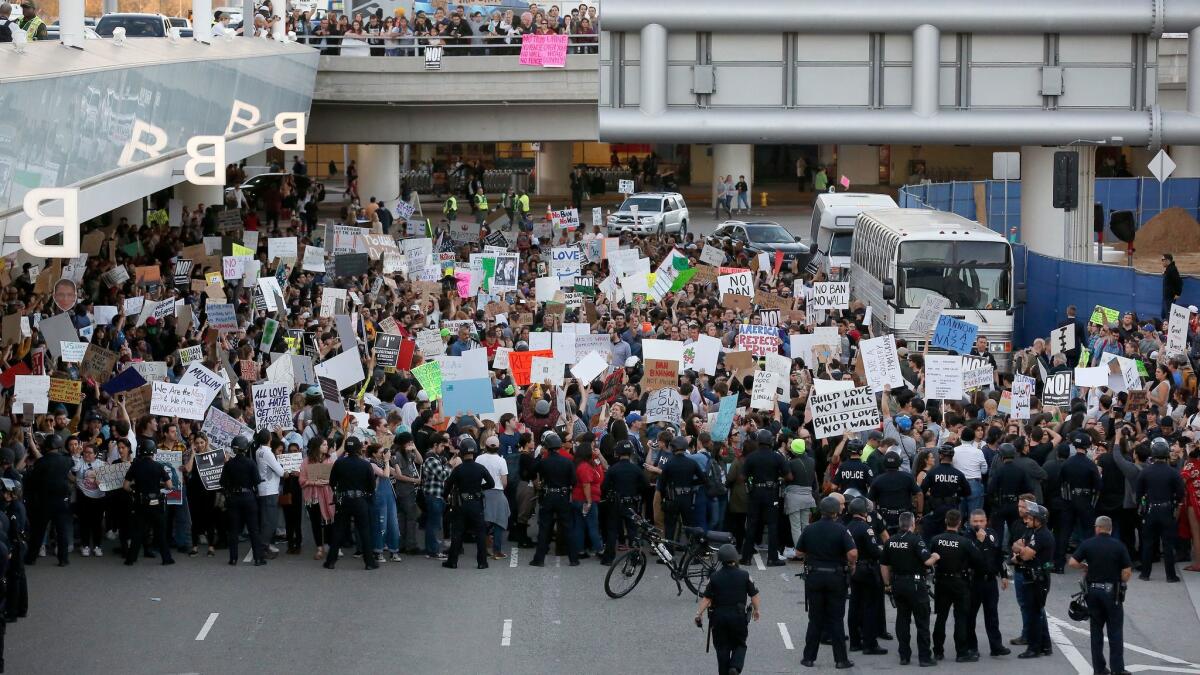Editorial: How Trump created chaos at the airport with his unfair and inhumane order

- Share via
The mere idea of President Trump’s executive order suspending the entry into the country of various visitors, migrants and refugees was bad enough, based as it was on the erroneous assertion that people from predominantly Muslim countries posed an escalated threat to the United States, and the contention — also without evidence — that existing vetting of arrivals from those countries was inadequate.
In execution, it was a disaster, plunging U.S. airports into chaos and displaying a shocking lack of forethought and planning and a deeply troubling failure of basic communication and coordination among and between federal and local authorities.
Would the ban apply to arriving passengers who already are lawful permanent residents holding so-called green cards? Yes, said the White House and the Department of Homeland Security on Saturday. But on Sunday, they changed their minds, saying it would not. What about holders of properly issued visas, who left their home countries under U.S. assurance that they would be admitted here? Why was Saudi Arabia (where Trump has business interests but where most of the 9/11 hijackers came from) left off the list of banned countries?
The president appeared to believe he could spring his order on the world the same way he might suddenly switch plumbing contractors on one of his buildings.
Set aside for a moment the question of whether denying entry to such people is manifestly unfair, illegal or even unconstitutional, and whether it is likely to set off a chain reaction of retaliatory measures against U.S. citizens living, working or visiting in other countries. Some more basic and urgent questions are what rules apply, who on the ground is interpreting them and whether those interpretations are being adequately and uniformly communicated.
At Los Angeles International Airport, and presumably at other airports around the country, it was unclear well into Sunday how many people were being detained. Loved ones and others awaiting the arrival of passengers had little to no access to information.
The horrendous episode smacks not just of a disregard for basic rights and decency, but of a level of amateurism not usually associated with the federal government. The president appeared to believe he could spring his order on the world the same way he might suddenly switch plumbing contractors on one of his buildings. He displayed a blind spot — or a callous contempt — for the impact of his action. If there was planning or consultation with career officials or homeland security experts, it was not apparent.
The inescapable question is whether this is the manner in which we can expect other new presidential programs to be rolled out. We can hope the answer is “no” — that the president will now have learned something of how government bureaucracy works, and of the impact of his decisions on real people in real time — but we fear the answer will be “yes.” Consider the president’s insistence, in the face of criticism over the weekend, that he did nothing much different on entry to the U.S. than President Obama did in the first months of his administration. If that were indeed the case, why did Trump previously make such an issue of how different his policies were from Obama’s? Can he truly believe that the chaotic scenes at airports were something manufactured by his political opponents? Trump’s learning curve may be long. Let’s hope that one at least exists.
At stake is more than the fate of refugees fleeing desperate conditions in war-torn countries, or the American traditions of welcome and fair play.
Also on the line is the confidence that Americans have, ought to have and are entitled to have in their government — and the confidence that other governments have in us. In the event of a real emergency — an act of war, a natural disaster, the outbreak of disease — that confidence is essential.
The good news arising from this weekend’s events is that the American system of law, of constitutionality and of checks and balances did work, after the fact and up to a point. Plaintiffs went to court. Judges stayed application of parts of Trump’s order.
That’s good, but it came after an awful lot of anxiety and consternation. Coming on top of Trump’s battle with Mexican leaders last week, his petulant squabbles with the press, his pointless obsession with the size of his inauguration crowd, his irresponsible order on Obamacare, we have to wonder: What on earth will week two bring?
Follow the Opinion section on Twitter @latimesopinion and Facebook
More to Read
A cure for the common opinion
Get thought-provoking perspectives with our weekly newsletter.
You may occasionally receive promotional content from the Los Angeles Times.










